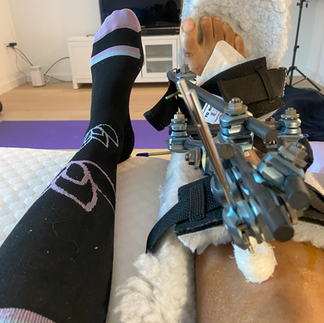Week 4 Road to 5K: Challenges of Discharge to Home and a Broken Healthcare System
- DaphneB
- Oct 6, 2024
- 6 min read
This week has been a rollercoaster of emotions, and I’m going to be as real as possible. After four weeks of recovering from a right leg fracture, I’ve come to realize that "Discharge to Home" isn't just a checkbox—it’s a steep mountain to climb. And it’s not just the physical recovery. Navigating our healthcare system, specifically health insurance, has made things harder than they ever should be.
For years, when I was practicing, I wrote "D/C to Home" for patients and never fully grasped how difficult it could be. I went through the struggles with my parents, but living through it myself has opened my eyes in ways I didn’t expect. This transition home is challenging, frustrating, and exhausting, especially when you're battling not only to heal but also to get the care and medications you need. And if I—a well-informed healthcare consumer—am struggling, what’s happening to those who don’t know how to navigate the system? What about those falling through the cracks?
Saturday, September 29 - The Calm Before the Storm
Yesterday was long, and I fell asleep watching Friends on my phone. I woke up multiple times during the night and tried to get comfortable. My sleep was broken but better than it had been.
The start of my day felt somewhat routine. I listened to podcasts, something I usually did during my gym and run time. It’s more about keeping my mind busy rather than feeding a healthy habit. Recovery has forced me to find new ways to stay mentally and emotionally occupied, especially since exercise as I knew it is temporarily on hold.
My day wasn’t bad overall. A bit of work, some decent food, and a delightful conversation with Evelyn about Chef AJ's book. I even managed to do a light workout—two sets of chair sit-to-stands and incline push-ups. Yet, this looming feeling of exhaustion had nothing to do with my physical activity.
Sunday, September 30 - Preparing for Discharge
Here’s where things started to get complicated. Tomorrow is discharge day, and I spent the day preparing for my journey home. It was a busy one. My nerves started kicking in about what I might face once I was home alone. No medical staff, no immediate help—just me and the hope that everything I need is lined up.
I confirmed my home care visit for wound care and IV antibiotics. I had a list of things to do and logistics to navigate. The team at UPMC was awesome, but by the end of the day, I was mentally and physically drained.
The thought of being home on my own, without direct support, left me feeling vulnerable. I knew I was capable, but that didn’t stop the anxiety from creeping in.
Tuesday, October 1 - Discharge Day
The day I had been both looking forward to and dreading had arrived. Discharge Day.
I woke up at 4 a.m., my mind racing with everything I might have forgotten. Update my plane ticket with assistance? Check. Ask my apartment manager to bring items to my unit? Check. But what about everything else?
The hospital staff, particularly the nurses, were incredible. Saying goodbye to them felt like leaving a safety net behind. They had become such a big part of my support system during my stay.
I was able to see Evelyn and give her a copy of Chef AJ's book! I can't wait to hear what recipes she tries when I return for my next surgery.
Then came the flight—an hour of pure discomfort. Navigating the airport on one foot, deplaning on the tarmac, and trying to make it home without a walker was a nightmare. If it weren’t for the kindness of strangers, I would’ve been stuck.
But the real challenge began when I got home. I made do with what I had—using my suitcase as a makeshift walker, hopping around my apartment just trying to get settled. I had some work to do to end the day. By the time I crawled into bed, I was utterly exhausted. But I made it.
Wednesday, October 2 - The Real Work Begins
Day one of being home, and I could already see how tough this was going to be. Establishing a new routine while dealing with limited mobility was harder than I anticipated. I managed to give myself a bird bath, did some light laundry, and started my wound care routine.
Desiree, my home care nurse, visited for the first time. She supervised me administering my IV antibiotics and provided some extra supplies. But the harsh reality set in when I learned that my insurance wouldn’t cover my wound care supplies. Seriously? United Healthcare was willing to jeopardize my recovery over $120 worth of supplies? I immediately ordered them from Amazon, but it made me wonder: What happens to those who can’t afford this out-of-pocket expense? Are they forced to risk infection because their insurance won’t cover basic necessities? This system is broken.
And the Lovenox? Walgreens only sent nine syringes for a medication I need twice daily for 30 days. Simple math tells you that doesn’t add up. Trying to get this sorted became a full-time job. The incompetence and lack of urgency from the pharmacy were astonishing but I was hopeful we could get this resolved.
Thursday, October 3 - Systemic Failures
I’m a bit of a nudge when it comes to making sure things get done, but even that didn’t help. By Thursday, I was still without the correct amount of Lovenox. I was livid after multiple phone calls and promises that weren’t kept. This isn’t just an inconvenience—it’s my health on the line. And what about those patients who don’t have the energy or know-how to push for their needs? They’re left vulnerable.
United Healthcare refusing to cover essential wound care supplies and Walgreens mishandling a critical prescription revealed a healthcare system that prioritizes bureaucracy over patient care. I couldn’t help but think about those less fortunate, those who don’t know how to fight the system. This isn’t just my battle; it’s a reality for so many others.
I am also amazed at the amount of waste in terms of supplies and plastics generated by healthcare. I have a trash bag next to the couch so that I can dispose of supplies during dressing changes and IV infusions. Wow! I am impressed by how much waste I am creating just as one person.
Friday, October 4 - A Small Win
Finally, my walker arrived—a bit late, but better than never. Putting it together felt like a small victory in an otherwise frustrating week. But life at home is far from easy. Simple tasks, like taking out the trash or carrying a bowl of food from the stove, feel monumental when you’re on one leg.
My friend Vincent, who works in my building, has been a godsend, bringing me packages and helping where he can. But it’s the everyday tasks I used to take for granted that remind me of how much this injury has disrupted my life.
Saturday, October 5 - Settling into a New Routine
By Saturday, I finally started to settle into a new routine. Exercises, wound care, meals, work—it’s the rhythm of my recovery now. But my weight continues to drop, which worries me. Despite eating what I can, my appetite is poor, and the healing process is draining my energy. I know I need to do better with my nutrition, but it’s tough when even meal prep feels like a marathon.
And the kicker? Walgreens still hadn’t sorted out my Lovenox prescription. No shipment, no resolution. It’s mind-boggling how dysfunctional the system has become. How do we let this happen?
The good thing is work. I had a wonderful call with the amazing women in the Menopause Mastery Program. This is my WHY.
I also want to thank everyone who called or texted to check in this week, especially my Kansas City friends (I miss you!!). I truly appreciate the encouragement and support.
The System Is Broken
Looking back on this week, one thing is abundantly clear: our healthcare system is broken. From insurance denials to prescription delays, every step of this process has been more difficult than it should be. I’m fortunate to have the resources and knowledge to fight for what I need, but what about those who don’t?
“Discharge to home” is not as simple as it sounds. It’s a complex, often isolating process that can leave patients vulnerable. Something needs to change because right now, the system isn’t working for anyone.















































Comments